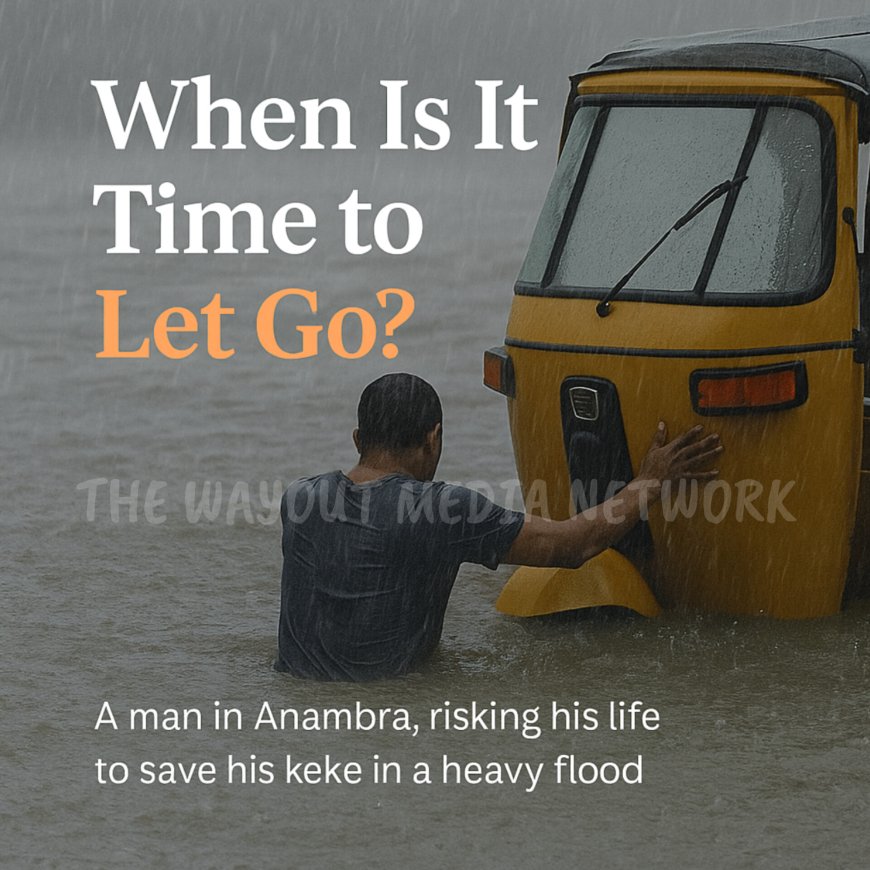When to Let Go: Risk, Resilience, and Survival in Hard Times.
A gripping story of a man risking his life to save his only means of livelihood - a tricycle - during a heavy flood in Anambra, Nigeria. This article reflects on when it's wise to let go, especially in life’s hardest moments.

In a video that recently went viral, a man in Anambra State was seen risking his life in a desperate attempt to save his tricycle (commonly known as keke) during a heavy downpour at Ochanja Market. The floodwaters raged, sweeping away anything not firmly anchored. Yet there he stood - half-submerged, clinging to his only source of livelihood.
It was a striking and emotional sight: one man against the storm, holding on not just to a vehicle, but to survival, dignity, and hope.
But it also raises a difficult question: When is it time to let go?
The Cost of Holding On
We often romanticize resilience and perseverance - and rightly so. The man’s actions were deeply symbolic of the Nigerian spirit: undaunted, enduring, unbroken. But there is a thin, often invisible line between courage and danger, between holding on and self-destruction.
What if the flood had claimed his life? Would saving the keke have been worth it?
This story brings into sharp focus the dilemma many Nigerians face daily: sacrificing everything just to protect the little they have. It is a reflection of how harsh economic realities push people into making impossible choices. For this man, the tricycle is not just property - it is possibly his only means of income, feeding his family, and staying afloat in a country where unemployment is high and social safety nets are nearly non-existent.
But even more urgent is the question: Do we know when to let go?
Holding On vs. Letting Go
Knowing when to let go is not a sign of weakness - it’s a form of wisdom. Yet, many of us struggle with this because we live in a society that rewards hustle without always considering health, safety, or sustainability.
People stay in:
Toxic jobs because they fear unemployment.
Abusive relationships because they dread societal shame.
Debt traps to maintain a social image.
Danger zones just to protect investments.
Letting go feels like failure, but sometimes it is survival.
What Drives This Desperation?
Several factors compel people to hold on dangerously:
1. Poverty and Lack of Insurance: If the man’s keke was insured, would he have risked his life?
2. Lack of Government Support: In many developed countries, disaster relief or small business grants would cushion such loss.
3. Cultural Conditioning: Many are taught that letting go means giving up - when it could mean staying alive for a better tomorrow.
A Call for Empathy and Systems that Work
Before judging this man’s decision, we must recognize the system that failed him. He was left to choose between life and livelihood—an impossible decision in a fair society.
Let this moment spark conversations about:
Emergency response infrastructure
Disaster preparedness in market areas
Micro-insurance for small business owners
Emotional education on healthy detachment
Final Thoughts
Sometimes holding on is brave.
Other times, letting go is even braver.
To anyone reading this, especially those battling storms in their personal or professional lives: Your worth is not tied to what you own, what you drive, or what you’ve built. You are not a failure for stepping back—you’re a survivor.
To the man at Ochanja: You reminded us of both the grit and the grief that define our society. We salute your strength - and hope that next time, someone is there to catch you before the flood does.







